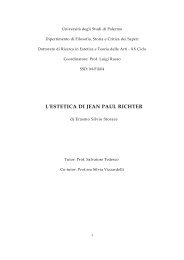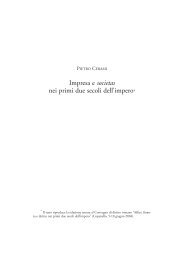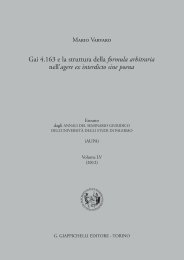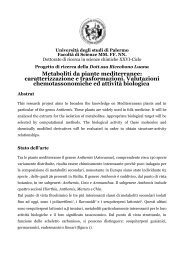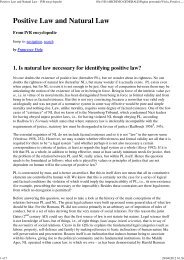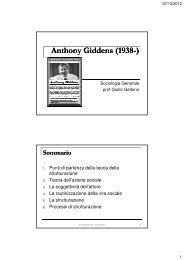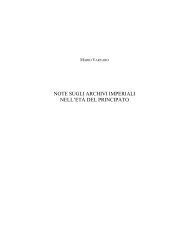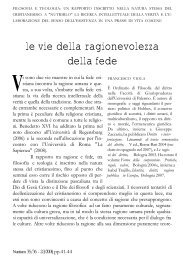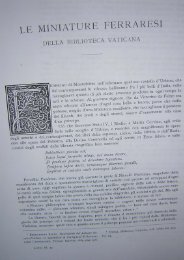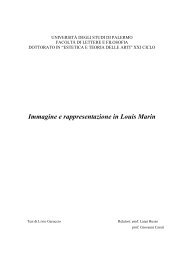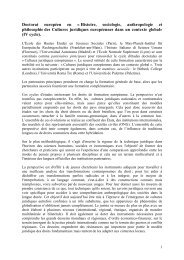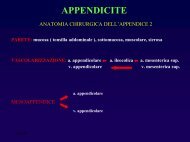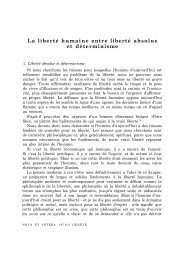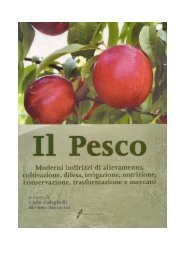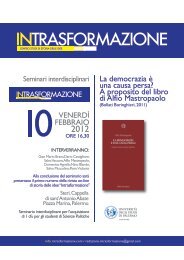F. TERRANOVA, Osservazioni su Gai 2.108 pp. 281 - Università di ...
F. TERRANOVA, Osservazioni su Gai 2.108 pp. 281 - Università di ...
F. TERRANOVA, Osservazioni su Gai 2.108 pp. 281 - Università di ...
Create successful ePaper yourself
Turn your PDF publications into a flip-book with our unique Google optimized e-Paper software.
sta non a sé ma al pater. Di conseguenza il fratello, se adhibitus in funzione<br />
<strong>di</strong> testis nel t.p.a.e.l., si troverebbe in sostanza a essere testimone<br />
non tanto del familiae emptor che, in quanto alieni iuris, non potrebbe<br />
trattenere nulla per sé, quanto del comune pater familias il quale,<br />
pur non essendo formalmente parte dell’atto, ne è giuri<strong>di</strong>camente il<br />
reale beneficiario. Al frater si sarebbe, quin<strong>di</strong>, in<strong>di</strong>rettamente a<strong>pp</strong>licata<br />
la causa <strong>di</strong> esclusione, espressa in <strong>Gai</strong> 2.105 (Tit. Ulp. 20.3), in base<br />
alla quale colui che è in potestà dell’avente causa dell’atto non può<br />
essere adhibitus come testimone nello stesso.<br />
È interessante notare come l’inciso ‘reprobatum est in ea re domesticum<br />
testimonium’ sia riferito da <strong>Gai</strong>o a conclusione del § 105, come<br />
conseguenza del fatto che, originariamente, familiae emptor e testatore<br />
fossero, a tutti gli effetti, parti del testamento librale. Il <strong>su</strong>ccessivo unde<br />
et, <strong>di</strong> cui al paragrafo 106, sembra sottolineare un ulteriore riflesso<br />
del principio. La medesima impressione si ricava da Tit. Ulp. 20.3-5.<br />
Tale modalità <strong>di</strong> esposizione ci induce a ipotizzare che il pater del familiae<br />
emptor e il frater eius, qui in eadem potestate est siano stati considerati<br />
testimoni inidonei, non solo genericamente per la loro a<strong>pp</strong>artenenza<br />
alla categoria dei domestici testes, attestata in <strong>Gai</strong> 2.105 (Tit.<br />
Ulp. 20.3), 34 ma anche specificamente per le ragioni più <strong>su</strong> esposte – e<br />
che, come evidenziato, variano qualora venga in considerazione la non<br />
attitu<strong>di</strong>ne a essere testimone del pater familias del familiae emptor o del<br />
frater eius – connesse al fatto che, originariamente, il testamento librale<br />
era un vero e proprio atto d’acquisto. 35 Altre fonti più tarde riferiscono,<br />
invece, il principio a tutti i soggetti legati al testatore da un vincolo<br />
familiare, fondato <strong>su</strong>lla patria potestas, senza <strong>di</strong>fferenziare più quali<br />
fossero, per ciascuna categoria, le ragioni specifiche dell’esclusione.<br />
Il principio sembra, quin<strong>di</strong>, as<strong>su</strong>rgere a unica causa <strong>di</strong> inidoneità, atta<br />
34 Non sempre, infatti, l’a<strong>pp</strong>artenere alla familia <strong>di</strong> uno dei soggetti che partecipano<br />
al testamento librale reprobatum est, ma solo quando questi ultimi siano partes dell’atto,<br />
ossia soggetti <strong>di</strong>rettamente interessati allo stesso. Cfr. Tit. Ulp. 20.6, il cui testo è riportato<br />
infra, a conclusione del § 3.1. V. anche le altre fonti citate alla nt. 55.<br />
35 Sul punto cfr. G. SCHERILLO, Corso <strong>di</strong> <strong>di</strong>ritto romano. Il testamento, II, cit., 14:<br />
«...la mancipatio familiae, anche se adattata a scopi particolari, era in origine un vero e proprio<br />
negozio d’acquisto». Sulla non o<strong>pp</strong>ortunità dell’impiego <strong>di</strong> quest’ultimo termine per<br />
qualificare giuri<strong>di</strong>camente mancipatio e in iure cessio v. R. SANTORO, Potere ed azione, cit.,<br />
296 nt. 19. Di <strong>di</strong>verso avviso, fra tutti, B. ALBANESE, Gli atti negoziali, cit., 7 ss. In argomento<br />
v. quanto già espresso <strong>su</strong>pra, alla nt. 22.<br />
296



